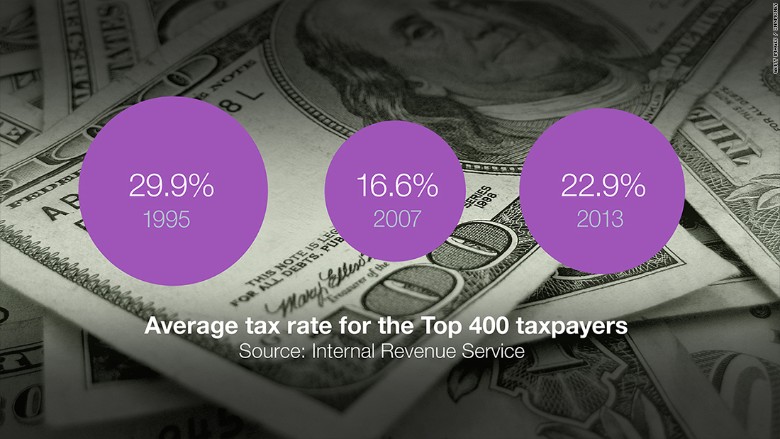
The rich are now paying more of their fair share in taxes, but they are still paying less than they did in the mid-1990s.
The Top 1% paid an average 27% of their income in federal taxes in 2013, the highest rate since 2002, according to recently released data from the IRS. In 2012, they only paid 22.8%.
The super wealthy saw their tax levy rise even higher. The average tax rate for the Top .01% rose to 26.2% in 2013, up from 19.5% the year before.
That's because Congress and President Obama agreed in late 2012 to raise the rate on long-term capital gains and dividends to 20% for high earners. It had been 15% since 2003, when then-President George W. Bush implemented his second set of major tax cuts.
Plus, in 2013, the wealthy were hit with an Affordable Care Act surcharge of 3.8% on capital gains, bringing the top rate to 23.8%. And, the highest income tax bracket returned to 39.6%.
Increasing tax rates on capital gains and dividends hits the rich particularly hard since much of their annual income comes from the sale of stocks and real estate, said Martin Sullivan, chief economist of Tax Analysts, which publishes tax information. Going from 15% to 23.8% is a "significant tax increase," he said.
Still, some want the wealthy to shoulder an even larger burden, which they say would help reduce income inequality. Just how much the rich pay in taxes is a hot button topic this election season. Democratic presidential contenders Hillary Clinton and Bernie Sanders want to further hike taxes on Wall Street and the wealthy. Both are expected to unveil more detailed tax plans this month.
"As president, I'll do what it takes to make sure the super-wealthy are truly paying their fair share," Clinton said earlier this month, noting her support for the so-called "Buffett Rule," which would impose a 30% rate in federal taxes on anyone making more than a million dollars a year after charitable donations.
Even Republican candidates, including Donald Trump and Jeb Bush, have pledged to raise taxes on hedge fund managers.
The rich used to fork over a whole lot more in taxes. Prior to 1997, the tax rate on long-term capital gains was 28%.
The Top 400 taxpayers paid an average of 29.9% of their income in federal taxes in 1995, but that rate dropped to a low of 16.6% in 2007, according to IRS data. It jumped to 22.9% in 2013.
Some experts, however, argue that the rich still get big breaks because they aren't taxed on the value of their stock and real estate holdings. They only send a check to the IRS when they sell their assets.
"Most income of billionaires never shows up on tax returns and is never taxed because it takes the form of unrealized capital gains," said Gabriel Zucman, assistant professor in the University of California Berkeley's economics department.


